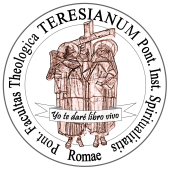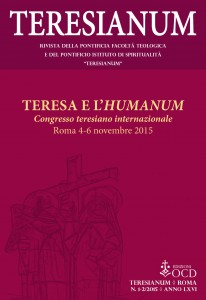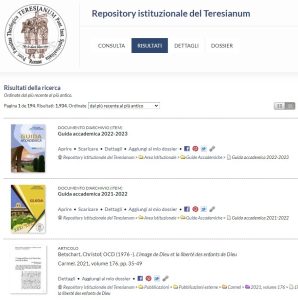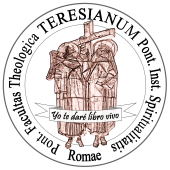New visions of humanity affect both public opinion and the sociocultural context. Recent proposals from the biomedical and technological sciences, as well as from disciplines such as psychology, economics, sociology and philosophy, seem to change the root of the traditional conception of humanity, once and for all. The perennial yearning of human beings in searching to know about themselves and the substantial non-deductibility of their being, inevitably leads to an infinite perspective, which continually delves further into the fullness of truth on what it means to be human.
Theology is situated within this context of different critical reflections on mankind, which, by its very physiognomy as the science of faith, participates theologically in the self-reflection of mankind. An anthropological, concise and organic treatment has been incorporated into Theology in relatively recent times. The event of the Second Vatican Council and the following reflection opened the way for dialogue between traditional Christian perspectives on what is human and modern thought. Critically rethought by taking into account cultural challenges, the current theological configuration of human themes on what is human – which is now called Theological Anthropology – is called to formulate a stimulating response. Welcoming the challenge of an “anthropological turn,” contemporary Christian Theology focuses its specific interest on the human individual. This contrasts with the more diffuse methodology of the past, where the division into various treatises produced a fragmented reading of humanity.
Therefore the present specialization is an interdisciplinary project that seeks to develop a renewed theological anthropology, by uniting the preoccupation about Christian identity (Christ as a normative event for becoming human, or Christian Anthropology), with existential, anthropological, cultural and experiential reality (Theological Anthropology). We find here the meaning of the inseparable relationship between Christian anthropology and theological anthropology: both grow from the normative source of faith (Revelation) and in reference to the historical-critical understanding that man has of himself in his day (the sociocultural and religious experience). The whole curriculum is structured around these two poles which, in a different but integrated way, constitute respectively their material and formal object.
Hence the conviction that theological Anthropology must be made up from the indispensable bond uniting Christology and anthropology, that is, by assuming the Christological event as a “principle” and “form” (Gestalt) freely carried out by man throughout history. Jesus Christ is the unique and singular event, historically verifiable and effectively contemporary to every person at all times. Faith in the God who gives himself to man in Christ entails a determination to be a person for all people (cf. Brambilla; GS 22). Jesus is both a truth to believe, and a form of belief, for Christ is not only the object of faith (fides theologalis), but also for all humanity a “filial form” and a model (fides Iesu).
This reflection on humanity’s destiny towards Christ and of his redemption and justification in Him requires a historical and ontological reference regarding man’s self-understanding in history. In other words, it requires connecting the truth of God communicated in Jesus to the process through which mankind freely seeks the truth. Theological Anthropology, therefore, will have to confront the different historical forms with which what is human is considered and understood in an objective mode and to demonstrate specifically the possibility of relationships (made of inseparability and difference) between the diverse cultural and religious visions and the specific vision of the Christian faith of mankind.
With the traditional triptych of creation, sin/grace and redemption/justification as a common thread, Theological Anthropology seeks to develop a coherent fundamental vision, guiding the various questions-challenges of today: particularly those relating to (1) nature in the context of scientific developments; (2) the modern concept of «subject» as an autonomous centre of consciousness and action; (3) the postmodern proposal of «difference» and «relationality» in the globalized world.
However, to answer the question «Who am I?», an intellectual effort or mere rational adherence to the truths of faith would not suffice. An appropriate response will have to be based on the «experience» of the good things that human beings preserve in themselves as the abode of God and, above all, on the experience of the union of love with Jesus Christ. In this sense, the fundamental axis of Anthropology is the category of «experience» synthesized in the Christological axiom of St Teresa of Jesus: «We shall never be completely ourselves if we do not strive to know God» (1 Mansions 2:9). This is an ontological view of the complete person, since such a perspective not only reverses the Greco-Western conception (i.e., the self-referentiality of the «I» in the light of the principle of Aristotelian identity), but also the personalistic vision, in which it is the «I» who goes towards a «thou». In the concept of Teresian mysticism, the «I» comes from a Thou (God) and is known in the «Thou» of Christ. «Seek yourself in Me» (Poetry 8) is the invitation that Teresa receives from Christ himself and it is in this invitation that lies the interpretive key of her concept about the universal question of “who is man “. Self-knowledge in Christ is enlightened and energized by the progress in love that the soul experiences at the same time. The anthropological-spiritual path involves fine-tuning, purifying love in order to be able to unite ourselves to Christ and to become perfect in Him, and to be able to perceive our own imago Dei.
Aim
The specialization in Theological Anthropology aims to offer the student, through the Second Cycle Program, the necessary tools to develop a single synthesis of two constituent principles of classical anthropology, that is, the principle of the imago Dei and that which understands man as a transcendent and open being. Through a thorough and contextualized study of this convergence, the student will be able to discern the various current problems concerning the Christian vision of man focused on the concept of person, endowed in addition with essential qualities such as historicity, culture, religiosity and intersubjectivity.
Skills ─ Knowledge
After working through the Second Cycle, the student will be trained to:
– Have a scientific knowledge of the message of Christian Revelation about the human being and to interpret theological texts that speak of it, in a way that is precise, valid and understandable in the current context;
– Exercise dialectics correctly in theological dialogue, develop interdisciplinary overviews and formulate informed conclusions on the anthropological question;
– Write and publish scholarly works that broaden knowledge of Anthropology in general, in a perspective of Christian faith;
– Plan and implement diverse programs of reflection on the faith, in a defined and differentiated dialogue with current cultures, with Christian religions and confessions.
This specialization is intended for students who, having completed the theological studies of the Institutional Cycle, want to achieve the degrees of:
a) Licence in Theology specialising in Theological Anthropology (cf. Statute, art. 5b).
b) Doctorate in Theology specialising in Theological Anthropology (cf. Statute, art. 5b).




